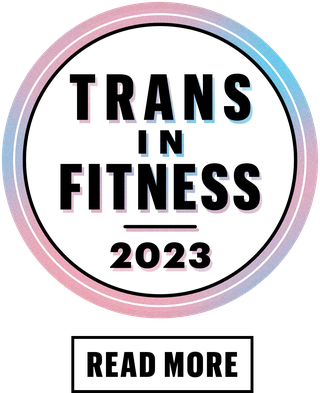This story is part of Trans in Fitness—a series of profiles that highlights the fitness changemakers who are making the world easier and healthier for their community. Read the rest of the inspiring stories here.
WHEN BODYBUILDER CODY Harman takes the stage at physique competitions, he’s not just showing off the results of months of arduous physical prep. He’s showing the payoff that comes from a decade of working towards becoming his truest self.
Harman first got into strength training in his mid-20s after missing fitness in his life. He was a keen runner in high school, and he wanted to get bigger. “I used to weigh a whopping 100 pounds,” he jokes. After he started to transition, he found bodybuilding to be a surprisingly ideal arena in which he was able to take up space as a trans man. “I can’t grow any taller, but I can grow out.”
Now 37, Harman works as a nutrition coach and personal trainer in Citrus Heights, California, who helps clients improve their general health, transform their bodies, and get competition-ready. He was first inspired to pursue this career after experiencing firsthand what a difference the right trainer or coach can make.
“I had a few awesome coaches growing up who helped me see what I was capable of, and pushed me to keep improving and believing in myself, even when I was going through some really dark times,” he says. “I want to have that same positive impact on others.”
Below, Harman tells Men’s Health how bodybuilding has helped him find joy, and the perspective he brings to training as a transgender man.
Men’s Health: How did you get into bodybuilding?
Cody Harman: I played a lot of sports in high school, and I’ve always been very health-conscious because my mom had cancer when I was younger. From an early age, I’ve always thought, how can I prevent this from happening to me. But the main thing that drew me to bodybuilding was my transition nine years ago.
Bodybuilding was a way for me to take control [of my life], and start my journey of feeling more comfortable in my own skin. As I progressed, and started taking part in physique competitions, it became a celebration of my journey and how far I had come, from not even wanting to wear a swimsuit and wearing a baggy T-shirt at the beach, to stepping out on a stage with hardly any clothes on. I am also a pretty routine-oriented, structured person, so bodybuilding is a fit for me. I love getting up to train every day and seeing my progress over time.
How does it feel for your body to be under such scrutiny as a competitive bodybuilder?
It can be a little scary, but that drives me. I like the challenge of it. But also, bodybuilding has been messing with gender norms for a long time, especially if you watch women’s bodybuilding, where the people competing don’t always conform to traditional ideas of the feminine body. A lot of bodybuilders occupy this kind of middle space, and they’ve always been allowed to. When you think about it, bodybuilding is the perfect sport for trans men.
Is it the perfect sport for trans men physically, or emotionally as well?
A lot of trans guys and trans people in general come from this place where they’ve felt uncomfortable in their own skin their whole lives. So this kind of training helps boost their confidence, and what they believe they can accomplish. Maybe they didn’t think they were capable of staying consistent with something, maybe they didn’t think they could bench a certain amount of weight. But now they can.
That carries over into other aspects of life, where perhaps they thought they weren’t smart or good enough to do something—apply for a job, or go back to school—but now they’re like, “If I can achieve that in the gym, then maybe I can do this.” That is the biggest mental benefit I could possibly think of.
What has your experience been like as a trans man within the bodybuilding space?
It’s largely a great space, but you’re always going to run into some people who aren’t so accepting of anyone who’s bending gender norms. Someone might say to a female bodybuilder, “You look like a man” and then they’ll look at me, someone who identifies as a man, and tell me I look like a woman. So there’s this shared camaraderie of just knowing we’re allowed to look however we want, and nothing else matters.
I haven’t personally come across a ton of transphobia within the bodybuilding community, but it’s definitely out there. We get these little keyboard warriors, but generally they’re people you never see in real life because they don’t actually compete, and they suck at bodybuilding anyway.
Largely with bodybuilding, the greatest part is the shared focus. It’s more about the goals we’re all chasing and what we have in common than our differences. It doesn’t matter how you were born, or how you identify, it’s [about] how we can all get bigger biceps. We’re in the gym, we’re having fun, that’s it.
You work with a lot of trans men. How does that differ from training cis guys?
A lot of guys come to me saying they want a more masculine shape. That might involve shedding fat around the hips, building a bigger chest, and creating this illusion of a narrower waist for that V-shaped taper. Or if they’re preparing for top surgery, then they might want to build their chest because it gives surgeons a better guideline to work by if they can already see a pec line.
There are little things that you need to consider depending on how far along someone is in their transition. For instance, early in transition, the hunger definitely kicks up because that testosterone gets into your system, and it’s like a second puberty. But that doesn’t last forever. I’ve found the best way to combat that is by making sure you get enough protein, whole foods, and high-volume foods.
At the same time, there are trans guys on the other side of the spectrum where they’ve been skinny their whole lives, so sometimes that appetite increase can be beneficial if they’re looking to gain size. But ultimately there isn’t a whole lot of difference as far as training and nutrition go. The biggest thing is just trans people feeling comfortable with me because I’ve gone through a lot of the same things.
It feels like every day there’s some new culture war talking point trying to stir up transphobia when the reality is most people seem cool with it and just want to get on with their lives.
I’ve had a guy at the gym casually tell me that he doesn’t “agree” with trans people or same-sex marriage and stuff like that, and I just sat there thinking to myself, wow, obviously he has no idea [I’m trans]. And that’s the majority of people; they have no idea they can be talking to a trans person about how they don’t agree with people transitioning, and you just have to laugh inside.
This interview has been edited and condensed for clarity.

Philip Ellis is a freelance writer and journalist from the United Kingdom covering pop culture, relationships and LGBTQ+ issues. His work has appeared in GQ, Teen Vogue, Man Repeller and MTV.






Comments are closed.